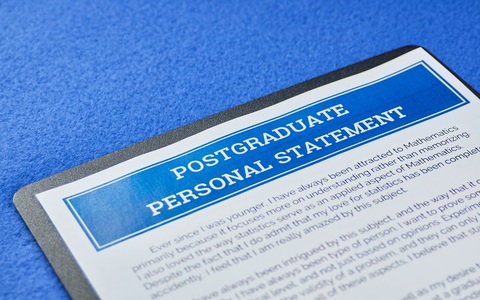 As you start preparing your graduate school applications, you’ll notice that they often require two very similar-sounding essays: the Personal Statement and the Statement of Purpose. What’s the difference between them?
As you start preparing your graduate school applications, you’ll notice that they often require two very similar-sounding essays: the Personal Statement and the Statement of Purpose. What’s the difference between them?
Broadly defined, the Personal Statement is, well, personal: it’s about you as a person. The Statement of Purpose is about—you guessed it—your purpose, which is to say, your goals in the program and beyond.
Personal Statement
Unlike personal essays for college, which can focus on any especially meaningful aspect of your experiences, your graduate school Personal Statement should focus on your life as it relates to your career aspirations.
This essay should be autobiographical and retrospective, and should take the shape of a story. You can discuss educational, familial, cultural, socioeconomic, or personal experiences or challenges; you can also mention relevant extracurricular activities that help explain who you are. How have your life experiences impacted your personal character, values, and chosen field?
Your Personal Statement can include a general description of your academic interests and career goals. You can incorporate your research experience and future interests in research, but typically this would not be a major component of the Personal Statement.
Statement of Purpose
In your Statement of Purpose, meanwhile, you’ll drill down into your academic interests and future plans. This essay should be more specific, technical, research based, and goals-focused; here, you’re looking forward rather than backward.
Explain why you are applying to grad school and be explicit about your qualifications for acceptance. Lay out your research interests and how they’ve developed through your academic and work experience; if you’ve had formative experiences with mentors, this is the place to mention them. State your career goals as specifically as possible.
And finally, discuss your fit with this particular program: which specific professors do you hope to work with? What resources would you hope to make use of? Which classes, research opportunities, and internships excite you most?
Comparison of the Essays
Let’s take an example of an applicant for an PhD in English. In your Personal Statement, you might discuss your passion for literature from a young age, and how you founded a new literary magazine at your college. You could also describe writing your college thesis on the role of science in Shakespeare’s plays. You could convey your enthusiasm, and how—hunched over your computer and a four-inch binder of notes—your years-long infatuation with analyzing Shakespeare’s tragedies crystallized into a desire to make this your career.
Your Statement of Purpose, meanwhile, would detail your training and qualifications to date; you would describe in a more factual manner the process of creating your thesis, including how you chose your topic, the sources you used, and how you developed and proved your arguments. In addition, you would cite the reasons the specific graduate program to which you’re applying would be the ideal fit for an English professor-in-training, the kind of research you hope to conduct in the future, and with which faculty members, and the specific shape of the career you hope will follow.
Examples of Essay Prompts
The PhD program in English at the University of Michigan has separate prompts for the Personal Statement and Statement of Purpose, which illustrate the differences between the two:
Personal Statement:
A clearly labeled biographical Personal Statement: statement about how your personal background and life experiences, including social, cultural, familial, educational, or other opportunities or challenges, motivated your decision to pursue a graduate degree at the University of Michigan. This is not an Academic Statement of Purpose, but a discussion of the personal journey that has led to your decision to seek a graduate degree.
Statement of Purpose:
A clearly labeled academic and intellectual Statement of Purpose: statement about your academic and research background, your career goals, and how Michigan’s graduate program will help you meet your career and educational objectives.
It is important to note that some schools do not require two separate essays, but rather one essay that combines elements of both the Personal Statement and Statement of Purpose. Take, for example, the essay requirement of Princeton’s PhD program in English:
Highlight current academic and future career plans as they relate to the Princeton degree program to which you are applying. Include relevant academic, professional, and personal experiences that influenced the decision to apply for graduate admission and obtain a graduate degree. Outline the goals for graduate study.
If the Personal Statement is a full plate—envision a piece of chicken with sides of roast potatoes and string beans—the Statement of Purpose is just the meat, trimmed of any excess fat. Whereas the Personal Statement aims to give a holistic view of who you are, the Statement of Purpose should omit discussions of anything extraneous, like extracurricular activities that don’t directly relate to your academic or career interests. In the Personal Statement, you can weave a captivating yarn; in the Statement of Purpose, you should stay on the ball.
There’s a reason why many grad school applications require both: taken together, they should give a full picture of who you’ve been, who you are now, and who – professionally – you hope to become.
The process of applying to grad school is complex. At Collegiate Gateway, we are experienced in the nuances of the grad school admissions process. If you would like additional guidance, feel free to contact us and register for a free consultation – as always we’re happy to help!
